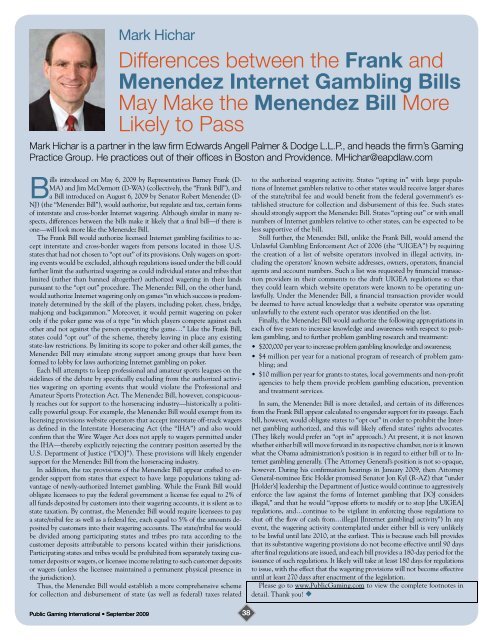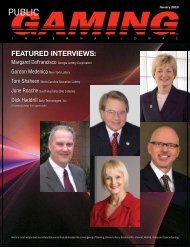The regular .pdf file can be viewed here. - Public Gaming Research ...
The regular .pdf file can be viewed here. - Public Gaming Research ...
The regular .pdf file can be viewed here. - Public Gaming Research ...
You also want an ePaper? Increase the reach of your titles
YUMPU automatically turns print PDFs into web optimized ePapers that Google loves.
Mark Hichar<br />
Differences <strong>be</strong>tween the Frank and<br />
Menendez Internet Gambling Bills<br />
May Make the Menendez Bill More<br />
Likely to Pass<br />
Mark Hichar is a partner in the law firm Edwards Angell Palmer & Dodge L.L.P., and heads the firm’s <strong>Gaming</strong><br />
Practice Group. He practices out of their offices in Boston and Providence. MHichar@eapdlaw.com<br />
Bills introduced on May 6, 2009 by Representatives Barney Frank (D-<br />
MA) and Jim McDermott (D-WA) (collectively, the “Frank Bill”), and<br />
a Bill introduced on August 6, 2009 by Senator Ro<strong>be</strong>rt Menendez (D-<br />
NJ) (the “Menendez Bill”), would authorize, but regulate and tax, certain forms<br />
of interstate and cross-border Internet wagering. Although similar in many respects,<br />
differences <strong>be</strong>tween the bills make it likely that a final bill—if t<strong>here</strong> is<br />
one—will look more like the Menendez Bill.<br />
<strong>The</strong> Frank Bill would authorize licensed Internet gambling facilities to accept<br />
interstate and cross-border wagers from persons located in those U.S.<br />
states that had not chosen to “opt out” of its provisions. Only wagers on sporting<br />
events would <strong>be</strong> excluded, although regulations issued under the bill could<br />
further limit the authorized wagering as could individual states and tri<strong>be</strong>s that<br />
limited (rather than banned altogether) authorized wagering in their lands<br />
pursuant to the “opt out” procedure. <strong>The</strong> Menendez Bill, on the other hand,<br />
would authorize Internet wagering only on games “in which success is predominately<br />
determined by the skill of the players, including poker, chess, bridge,<br />
mahjong and backgammon.” Moreover, it would permit wagering on poker<br />
only if the poker game was of a type “in which players compete against each<br />
other and not against the person operating the game…” Like the Frank Bill,<br />
states could “opt out” of the scheme, t<strong>here</strong>by leaving in place any existing<br />
state-law restrictions. By limiting its scope to poker and other skill games, the<br />
Menendez Bill may stimulate strong support among groups that have <strong>be</strong>en<br />
formed to lobby for laws authorizing Internet gambling on poker.<br />
Each bill attempts to keep professional and amateur sports leagues on the<br />
sidelines of the debate by specifically excluding from the authorized activities<br />
wagering on sporting events that would violate the Professional and<br />
Amateur Sports Protection Act. <strong>The</strong> Menendez Bill, however, conspicuously<br />
reaches out for support to the horseracing industry—historically a politically<br />
powerful group. For example, the Menendez Bill would exempt from its<br />
licensing provisions website operators that accept interstate off-track wagers<br />
as defined in the Interstate Horseracing Act (the “IHA”) and also would<br />
confirm that the Wire Wager Act does not apply to wagers permitted under<br />
the IHA—t<strong>here</strong>by explicitly rejecting the contrary position asserted by the<br />
U.S. Department of Justice (“DOJ”). <strong>The</strong>se provisions will likely engender<br />
support for the Menendez Bill from the horseracing industry.<br />
In addition, the tax provisions of the Menendez Bill appear crafted to engender<br />
support from states that expect to have large populations taking advantage<br />
of newly-authorized Internet gambling. While the Frank Bill would<br />
obligate licensees to pay the federal government a license fee equal to 2% of<br />
all funds deposited by customers into their wagering accounts, it is silent as to<br />
state taxation. By contrast, the Menendez Bill would require licensees to pay<br />
a state/tribal fee as well as a federal fee, each equal to 5% of the amounts deposited<br />
by customers into their wagering accounts. <strong>The</strong> state/tribal fee would<br />
<strong>be</strong> divided among participating states and tri<strong>be</strong>s pro rata according to the<br />
customer deposits attributable to persons located within their jurisdictions.<br />
Participating states and tri<strong>be</strong>s would <strong>be</strong> prohibited from separately taxing customer<br />
deposits or wagers, or licensee income relating to such customer deposits<br />
or wagers (unless the licensee maintained a permanent physical presence in<br />
the jurisdiction).<br />
Thus, the Menendez Bill would establish a more comprehensive scheme<br />
for collection and disbursement of state (as well as federal) taxes related<br />
to the authorized wagering activity. States “opting in” with large populations<br />
of Internet gamblers relative to other states would receive larger shares<br />
of the state/tribal fee and would <strong>be</strong>nefit from the federal government’s established<br />
structure for collection and disbursement of this fee. Such states<br />
should strongly support the Menendez Bill. States “opting out” or with small<br />
num<strong>be</strong>rs of Internet gamblers relative to other states, <strong>can</strong> <strong>be</strong> expected to <strong>be</strong><br />
less supportive of the bill.<br />
Still further, the Menendez Bill, unlike the Frank Bill, would amend the<br />
Unlawful Gambling Enforcement Act of 2006 (the “UIGEA”) by requiring<br />
the creation of a list of website operators involved in illegal activity, including<br />
the operators’ known website addresses, owners, operators, financial<br />
agents and account num<strong>be</strong>rs. Such a list was requested by financial transaction<br />
providers in their comments to the draft UIGEA regulations so that<br />
they could learn which website operators were known to <strong>be</strong> operating unlawfully.<br />
Under the Menendez Bill, a financial transaction provider would<br />
<strong>be</strong> deemed to have actual knowledge that a website operator was operating<br />
unlawfully to the extent such operator was identified on the list.<br />
Finally, the Menendez Bill would authorize the following appropriations in<br />
each of five years to increase knowledge and awareness with respect to problem<br />
gambling, and to further problem gambling research and treatment:<br />
• $200,000 per year to increase problem gambling knowledge and awareness;<br />
• $4 million per year for a national program of research of problem gambling;<br />
and<br />
• $10 million per year for grants to states, local governments and non-profit<br />
agencies to help them provide problem gambling education, prevention<br />
and treatment services.<br />
In sum, the Menendez Bill is more detailed, and certain of its differences<br />
from the Frank Bill appear calculated to engender support for its passage. Each<br />
bill, however, would obligate states to “opt out” in order to prohibit the Internet<br />
gambling authorized, and this will likely offend states’ rights advocates.<br />
(<strong>The</strong>y likely would prefer an “opt in” approach.) At present, it is not known<br />
whether either bill will move forward in its respective cham<strong>be</strong>r, nor is it known<br />
what the Obama administration’s position is in regard to either bill or to Internet<br />
gambling generally. (<strong>The</strong> Attorney General’s position is not so opaque,<br />
however. During his confirmation hearings in January 2009, then Attorney<br />
General-nominee Eric Holder promised Senator Jon Kyl (R-AZ) that “under<br />
[Holder’s] leadership the Department of Justice would continue to aggressively<br />
enforce the law against the forms of Internet gambling that DOJ considers<br />
illegal,” and that he would “oppose efforts to modify or to stop [the UIGEA]<br />
regulations, and…continue to <strong>be</strong> vigilant in enforcing those regulations to<br />
shut off the flow of cash from…illegal [Internet gambling] activity”) In any<br />
event, the wagering activity contemplated under either bill is very unlikely<br />
to <strong>be</strong> lawful until late 2010, at the earliest. This is <strong>be</strong>cause each bill provides<br />
that its substantive wagering provisions do not <strong>be</strong>come effective until 90 days<br />
after final regulations are issued, and each bill provides a 180-day period for the<br />
issuance of such regulations. It likely will take at least 180 days for regulations<br />
to issue, with the effect that the wagering provisions will not <strong>be</strong>come effective<br />
until at least 270 days after enactment of the legislation.<br />
Please go to www.<strong>Public</strong><strong>Gaming</strong>.com to view the complete footnotes in<br />
detail. Thank you! u<br />
<strong>Public</strong> <strong>Gaming</strong> International • Septem<strong>be</strong>r 2009 38




